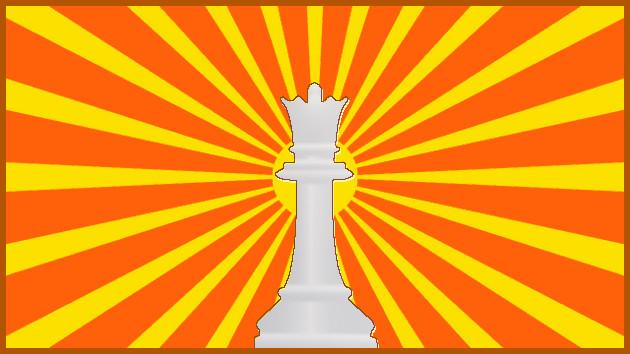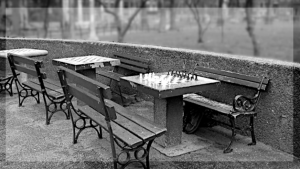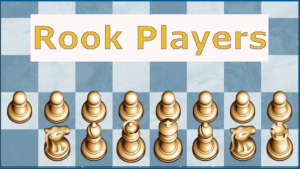
First Brilliancy Prizes
Throughout the years there have been hundreds, maybe thousands, of brilliancy prizes offered. Some are just games, albeit extremely clever ones, while others have their own stories. Some even have stories that hover around them. Let's travel through time and explore a few earlier examples of these exemplary games and follow some of the byways along the route.


The very first Brilliancy Prize was awarded to Henry Bird in 1876. This game was annotated in Reuben Fine's "The World's Great Chess Games." In his introduction to Bird, Fine wrote:
Bird was what we would call a 'natural player.' He cared little for theory, that is, what others thought, and went his own way. The attack was his happy hunting ground, and he often disregarded positional considerations to pursue it for all it was worth. Against great masters this policy did not work, but against lesser lights he produced many a sparkling gem.
According to the "Westminster Papers" on Oct. 1876:
The Centennial tournament organized by the "New York Clipper" was arranged to commence at the Café International, New York, on the 15th ultimo. Three prizes will be given by Mr. Queen, viz. 100 dollars, 50 dollars, and 25 dollars, and Mr. Lieders, the proprietor of the café where the games will be played offers a handsome silver cup as a prize for the winner of the most brilliant game occurring in the tourney.

Siegfried Lieders was only 21 when he moved from Germany to New York in 1854. In the 1860s he became the proprietor of the Café Europa, located at 12-14 Division street, NYC, which opened rooms specifically for chess and which the "Dubuque Chess Journal" noted being "at that time the principal rendezvous for the chess talent of the metropolis." In the 1870s he opened the chess-famous Café International.
He moved to Rochester, NY in 1878 where he managed the recently built Bartholomay Cottage Hotel, owned by the wealthy German brewery magnate, Henry Bartholomay, until 1886 when he moved to Detroit, managing the Hotel Benedict on the corner of Randolf and Larned streets until he leased it in 1892 and renamed it the Hotel Lieders. Lieders died on April 4, 1893.
The "Clipper" itself on Nov. 4, 1876 revealed that this tournament, called "The Clipper Free Centennial Tourney" and lasted from Sept. 20th to Oct. 18th, was won by James Mason with 16 wins, for which he received $100. Eugene Delmar, who came in second with 15 wins and one draw, earned himself $50. H.E. Bird won 15 games (and presumably lost one) and $25. At this point there were 7 nominations for the "Lieders Cup." When finally voted upon, Bird won that brilliancy prize unanimously.
In "Russian Sillouettes" the great storyteller, Genady Sosonko wrote (on p.127):
Under the guidance of Romanovsky they analyzed games, developed openings, and played theme tournaments. Often he would talk about the leading players from the past. Zak tried to carry over the aroma of these lessons to the children in the Pioneers' Palace.
'Who, do you think, was the strongest player of all at the end of the last century?' he would ask, copying Romanovsky.
The children had absolutely no idea what to answer, and were totally at a loss: "Steinitz? Chigorin?"
"That is what we too replied," said Vladimir Grigoryevich.
After all the conceivable names had been given, Romanovsky, raising his index finger, would say: "Mason, you should look at Mason's games. Mason played stronger than anyone..."
Only on becoming more grown up, were the children to learn the conclusion of this sentence, which was not said to them for pedagogical reasons. It was : "... if he was sober, of course, and this did not happen often..."

It seemed the next game may have had an interesting story since according the "British Chess Magazine," Nov. 1888 (p.444):
Germany.—The prize of £5 5s. offered by Mr. F. H. Lewis of London, for the prettiest game in the last Frankfort Congress, has been awarded to M. Schiffers of St. Petersburg, for his game with Herr Harmonist. This is rather a late decision, as the Frankfort tourney was held in July, 1885.
The prize was possibly partly based upon the deflection tactic on move 16, followed up with impeccable technique.
more on Emmanuel Schiffers
more on Max Harmonist

The May-June tournament in Paris at the turn of the century coincided with the Paris Exposition Universelle that opened in April. Emanuel Lasker won 1st place and 5000 francs. Jaques Mieses, who only tied for 7th-9th place, won 300 francs plus 500 francs, donated by Baron Albert de Rothschild, for the 1st Brilliancy Prize. The tournament was particularly interesting because it involved a concerted attempt to dispel the drawing tenancies of the masters by making them replay all drawn games (but counting the draw if one re-occurred in the replay).
In this game Mieses leaves his Queen en pris for a half-dozen surprising moves —


Ostend, 1900
The 1906 tournament at coastal Flemish city of Ostend was played during the warm summer month of June and July. Carl Schlecter took first place, winning 4,000 francs and a gold medal. For all that he failed to win any of the 14 brilliancy prizes.
The Ladies' Tournament at Ostend was won by Miss Grace Ellis (290 fr.), Mrs. Donald Anderson (265 fr.), Mrs. Frances Dunn Herring (215 fr.)and Mrs. E. Oakley (no prize listed) - all members of the famous of the Ladies' Chess Club of London (10 of the 13 competitors were from Great Britain). Each of the lady contenstants was presented with a piece of Brussels lace as a souvenir.
This pretty Queen sac let Dawid Janowski share the 1st Brilliancy Prize at Ostend 1906 —
Blackburne also shared the 1st Brilliancy Prize at Ostend 1906 with this win over the obscure German master Walter John (a pharmacist by trade, he was spotlight by Nimzowitsch as having absolutely no imagination while still a strong player, showing the value of training over talent). —
Oldrich Duras also shared the Ostend 1906 1st Brilliancy Prize for his win over Richard V.
The fourth shared 1st Brilliancy Prize at Ostend 1906 went to Frank Marshall, playing Black. Each 1st Brilliancy Prize was worth 125 francs. Three years later, Marshall's German opponent, as if straight from an Edwin Arlington Robinson poem, " put a bullet through his head."
The 2nd brilliancy prize of 100 francs went to Burn for his game with Johner and to Maróczy for his game with Blackburne.
The third brilliancy prize of 50 francs was collected by Taubenhaus (Spielmann), Marco (Wolf), Mieses (Janowski), Leonhardt (Süchting), Burn (Znosko-Borovsky), Wolf (John), Swiderski (Spielmann), Reggio (Post), and Perlis (Salwe).

Already in Europe for the 1907 tournament in Ostend, Frank Marshall was killing time waiting for the start of the tournament in Carlsbad. He decided to visit Paris. While there, he was invited, along with Savielly Tartakower, to play in a tournament, hastily arranged in their honor, at the Café de la Régence. The 2 first-place winners were Marshall and a relatively unknown Greek player named Eugène Michel Antoniadi (Eugenios Antoniadis), a highly regarded astronomer, whose only loss was to another relatively unknown Parisian player Jean de Villeneuve-Esclapon who would later become a respected chess problemist. A play-off was arranged and Marshall was able to secure the win.

now on to the tournament at Carlsbad -
Carlsbad 1907:
Baron Albert Rothschild gave a brilliancy prize of 500 kronen. Of this, Herr Maroczy received 300 kronen for a game against Tartakower; Herr Leonhardt (against Tartakower) and E. Cohn (against Tchigorin) each received 100 kronen. The brilliancy prize of 100 kronen given by Herr H. von Mattoni, proprietor of the well-known watering-place, Grosshübel-Sauerbrunn, was won, ex aequo, by Mieses (against Tartakower) and Janowski (against Berger) —"BCM," Oct. 1907
Trying to determine the relative worth of a 1907 kronen to a dollar today is tricky business. There are a multitude of variables and modes of comparison. Although the answer can vary widely, a conservative compromise might suggest that In 1907 a kronen was worth about $.20 American and $.20 in 1907 might be worth about $5.00 today. This would mean that 1 kronen in 1907 could compare to $5.00 today.100 kronen
50 kronen

Next we have what might be considered 23 year old Capablanca's coming-out party. The 1st Brilliancy Prize was awarded to Capablanca for his win over Ossip Bernstein at San Sebastian - which was also his first major tournament victory. In this tournament, arbitrated by Jaques Mieses, all the participants' travel expenses were covered and all players were to receive 80-100 francs (depending on the number of contestants) for each point earned. (see "Aron Nimzowitsch on the Road to Chess Mastery" by Per Skjoldager and Jørn Erik Nielsen).
From "My Chess Career" by José Raúl Capablanca:
The conditions of this tournament made it the best that could be had. It was limited to those players who had won at least two third prizes in previous first-class international tournaments. An exception was made with respect to me, because of my victory over Marshall. Some of the masters objected to my entry before this clause was known. One of them was Dr. Bernstein. I had the good fortune to play him in the first round, and beat him in such fashion as to obtain the Rothschild prize for the most brilliant game of the tournament.

And Finally . . . Although the New York 1924 was won by Em. Lasker, although Reti ended Capablanca's 8 yr. 1 mo. non-losing streak (of 63 games : 40 wins, 23 draws) in that same tournament, it was the following game against Bogoljubov that won Reti the 1st Brilliancy Prize.
But the Brilliancy Prize, it turned out, wasn't so cut and dried. as this letter published in the 1949 issue of "Chess Review" testifies:
The local chess-players were divided into Capablanca, Marshall and Réti camps, and I was in the center as a member of the brilliancy prize committee. I was strongly in favor of giving the first prize to Réti for his game against Bogoljubow. The other judges were Hermann Helms and Norbert Lederer, and it was common knowledge that originally the committeemen did not see eye to eye. However, on the night before the dinner at which the awards were to be made, the committee finally unanimously selected this game for first prize. The next day a bomb burst. There had been a leak, and Herbert R. Limburg, president of the congress, was in a dither. He had received a letter from John Barry, objecting to the committee’s decision. The letter also included a vitriolic attack against me. It began about as follows: “It has come to my knowledge that one Meyer, who is either a knave or a moron, has decided to give the brilliancy prize to Réti”. The balance of the letter, besides discussing patriotism, included a system for deciding prizes, with points for various types of sacrifices, all of which added up to first prize for Marshall for his game with Bogoljubow. At a hastily called meeting of the tournament committee, the decision of the brilliancy prize committee was upheld. To further sustain the verdict, I quote the following from Dr Alekhine’s annotations to the Réti- Bogoljubow game in the tournament book: “Rightfully, this game was awarded the first brilliancy prize”. In 1930, I met Dr Tartakower in Paris. He told me that, in his opinion, when all other details of the tournament are forgotten, the Réti- Bogoljubow game will be remembered as one of the six greatest games ever played. …It is like judging any other work of art: the experts are bound to disagree. Just for the record, in later years, Barry apologized, and we buried the hatchet.
-Leonard B. Meyer




